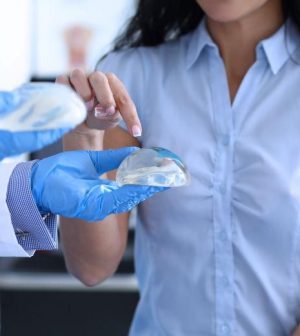- 7 Best Breads for Maintaining Stable Blood Sugar
- Gelatin vs. Collagen: Which is Best for Skin, Nails, and Joints?
- The Long-Term Effects of Daily Turmeric Supplements on Liver Health
- Could Your Grocery Store Meat Be Causing Recurring UTIs?
- Are You Making This Expensive Thermostat Error This Winter?
- Recognizing the Signs of Hypothyroidism
- 10 Strategies to Overcome Insomnia
- Could Artificial Sweeteners Be Aging the Brain Faster?
- Techniques for Soothing Your Nervous System
- Does the Water in Your House Smell Funny? Here’s Why
FDA Warns of Rare Cases of Certain Cancers Linked to Breast Implants

FRIDAY, Sept. 9, 2022 (HealthDay News) – The U.S. Food and Drug Administration on Thursday warned doctors and their patients about rare cases of squamous cell carcinoma and various lymphomas developing in the scar tissue that forms around breast implants.
These cancers are different than an earlier FDA warning about Breast Implant-Associated Anaplastic Large Cell Lymphoma (BIA-ALCL).
Federal regulators discovered reports of the cancers as part of its routine post-market review and cautioned that their understanding of what’s going on is still evolving.
So far, cases are rare: There have been fewer than 20 cases of squamous cell carcinoma (SCC) and fewer than 30 cases of various lymphomas reported in the capsule around breast implants, the FDA said.
“While the FDA believes that occurrences of SCC or various lymphomas in the capsule around the breast implant may be rare, health care providers and people who have or are considering breast implants should be aware that cases have been reported to the FDA and in the literature,” the FDA said in its warning.
Symptoms of these cancers can include swelling, pain, lumps or skin changes.
Cases have included those happening in women who have had implants for years. Reports have been made for both saline and silicone breast implants, as well as for those that are textured and smooth.
Breast implants are used for women who have lost tissue due to cancer and trauma, for those who want to increase breast size and to correct past surgeries. They are implanted under the breast tissue or chest muscle.
Two types of implants are approved in the United States — those filled with saline and those filled with silicone. Both types have a silicone shell. Implants can vary in size, shell thickness, surface texture and shape.
Typically, the longer a woman has them, the more likely it is they will need to be removed or replaced.
Women who have or are considering implants do not need to change their routine medical care but should learn more about the risks and benefits of breast implants, the FDA said. Women should also monitor their implants for as long as they have them, calling their surgeon or other health care provider promptly if they notice any changes.
The FDA is not suggesting women remove their implants because of this safety announcement. However, those who do experience a problem should file a report through MedWatch, the FDA’s Safety Information and Adverse Events Reporting program.
The FDA plans to continue working with others to gather and review data.
More information
The U.S. Food and Drug Administration has more on the risks and complications of breast implants.
SOURCE: U.S. Food and Drug Administration, news release, Sept. 8, 2022
Source: HealthDay
Copyright © 2026 HealthDay. All rights reserved.










